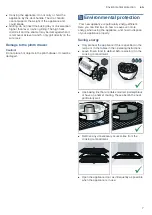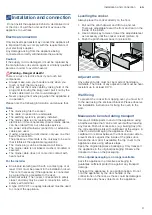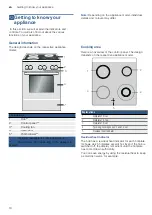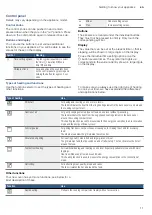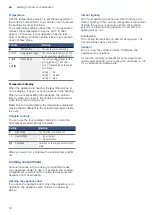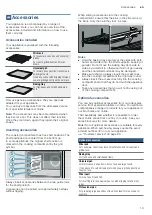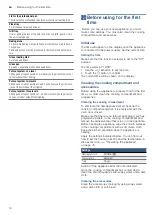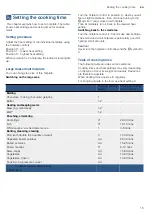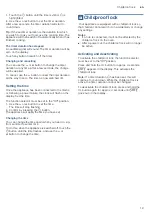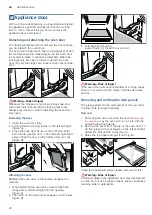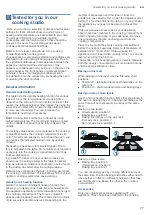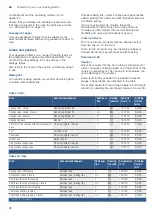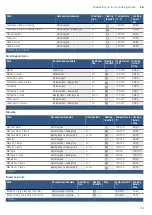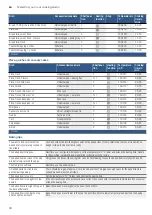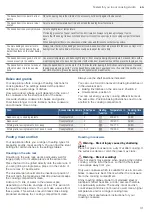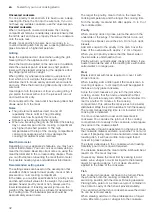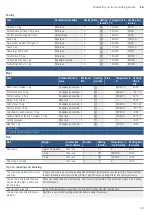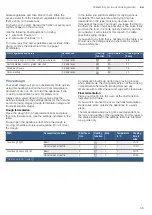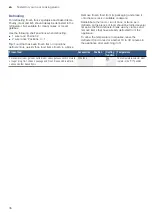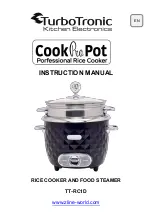
Cleaning
en
21
Notes
■
Slight differences in colour on the front of the
appliance are caused by the use of different
materials, such as glass, plastic and metal.
■
Shadows on the door panels, which look like
streaks, are caused by reflections made by the
interior lighting.
■
Enamel is baked on at very high temperatures.This
can cause some slight colour variation. This is
normal and does not affect operation.
The edges of thin trays cannot be completely
enamelled. As a result, these edges can be rough.
This does not impair the anti-corrosion protection.
Surfaces in the cooking compartment
The back wall in the cooking compartment is self-
cleaning.You can tell this from the rough surface.
The base, ceiling and side panel are enamelled and
have smooth surfaces.
Cleaning enamel surfaces
Clean the smooth enamel surfaces with a dish cloth
and hot soapy water or a vinegar solution. Then dry
them with a soft cloth.
Soften baked-on food remnants with a damp cloth and
soapy water. Use stainless steel wire wool or oven
cleaner to remove stubborn dirt.
Glass hob*
(depending on appli-
ance model)
Care: Protective/care products for glass
Cleaning: Cleaning agents for glass.
Follow the cleaning instructions on the packag-
ing.
:
Glass scraper for stubborn dirt:
Remove the protective cover and clean using
the blade only. Caution: The blade is very
sharp. Risk of injury.
Cover the blade again after cleaning. Replace
damaged blades immediately.
Glass panel
Glass cleaner:
Clean with a soft cloth.
Do not use the glass scraper.
The door can be removed to facilitate cleaning.
To find out how to do this, please refer to the
section
Removing and refitting the
oven door
.
Childproof lock*
(depending on appli-
ance model)
Hot soapy water:
Clean with a dish cloth.
If a childproof lock has been fitted to the oven
door, it must be removed before cleaning.
If it is very dirty, the childproof lock will not
work properly.
Seal
Do not remove.
Hot soapy water:
Clean with a dish cloth. Do not scour.
Cooking zone
Hot soapy water or a vinegar solution:
Clean with a dish cloth.
For stubborn dirt, use a stainless steel scour-
ing pad or oven cleaner.
Only use when the cooking compartment is
cold.
:
Please use the self-cleaning function to
clean self-cleaning surfaces. To find out how to
do this, please refer to the section
Self-
cleaning
.
Caution! Never use oven cleaner on self-clean-
ing surfaces.
Glass cover for the
oven light
Hot soapy water:
Clean with a dish cloth.
Shelf
Hot soapy water:
Clean with a dish cloth or a brush.
You can remove the shelves for cleaning. To
find out how to do this, please refer to the sec-
tion
Removing and refitting shelves
.
Telescoping extension rails*
(depending on appliance model)
Hot soapy water:
Clean with a dish cloth or a brush.
Do not remove the lubricant from the extension
rails. It is best to clean them when they are
pushed in. Do not soak, clean in the dish-
washer, or clean in the oven as part of the self-
cleaning programme. This may damage the
shelves and they may no longer work properly
as a result.
Zone
Cleaning agent
* Optional (available for some appliances, depending on the appliance
model)
Accessories
Hot soapy water:
Soak and then clean with a dish cloth or a
brush.
Enamelled accessories are dishwasher-suita-
ble.
Aluminium baking tray*:
(depending on appliance model)
Dry with a soft cloth.
Do not clean in the dishwasher.
Never use oven cleaner.
To prevent scratches, never touch the metal
surfaces with a knife or a similar sharp object.
Harsh cleaning products, scratchy sponges
and rough cleaning cloths are not suitable.
Otherwise, you may scratch the surface.
Rotary spit*
(depending on appliance model)
Hot soapy water:
Clean with a dish cloth or a brush. Do not clean
in the dishwasher.
Meat thermometer*
(depending on appliance model)
Hot soapy water:
Clean with a dish cloth or a brush. Do not clean
in the dishwasher.
Plinth drawer*
(depending on appli-
ance model)
Hot soapy water:
Clean with a dish cloth.
Zone
Cleaning agent
* Optional (available for some appliances, depending on the appliance
model)

